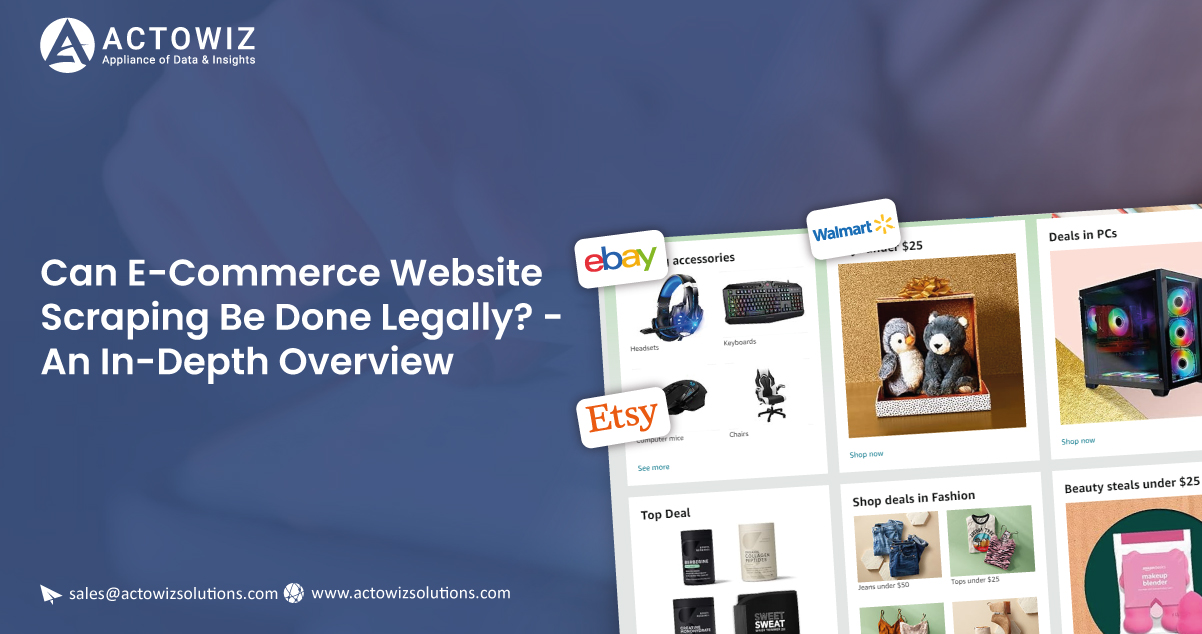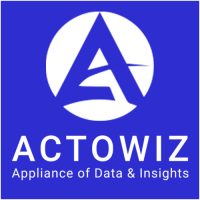Legality of E-Commerce Website Scraping | A Comprehensive Overview

Introduction
In today’s e-commerce-driven environment, e-commerce data scraping is a pivotal tool. At Actowiz Solutions, our expertise lies in providing top-tier web scraping services tailored for e-commerce websites legal frameworks. As e-commerce data collection becomes crucial for market leadership, questions about the legality of scraping ecommerce websites are commonplace.
For a broader understanding of the legal landscape, our earlier blog titled “Is Web Scraping Legal?” offers insights into the overarching legalities of web scraping. E-commerce data scraping, while integral to data-driven strategies, treads a delicate line regarding legality. Utilizing automated scripts for e-commerce data collection can often be perceived as navigating a grey area, requiring precision to avoid potential infringements.
This comprehensive guide seeks to demystify the intricacies of scraping ecommerce websites. We’ll delve deep into the e-commerce data scraping dynamics, highlighting the nuances that separate legitimate e-commerce data collection from legal complications. Our mission is to empower e-commerce stakeholders with the expertise needed to efficiently and ethically leverage web scraping services, ensuring alignment with legal e-commerce data scraping parameters.
As staunch advocates for responsible web scraping, Actowiz Solutions prioritizes disseminating vital information regarding the e-commerce website’s legal landscape. We’ll elucidate the legal dimensions of e-commerce data scraping, offering actionable strategies to safeguard your operations and maintain compliance with e-commerce data collection regulations.
Understanding the Legal Implications of E-Commerce Website Scraping: Significance for Your Business Strategy
Navigating the legal landscape of e-commerce data collection through web scraping is intricate. For businesses outside the realm of giants like Google or Apple, the penalties for non-compliance can be financially crippling. While e-commerce websites legal parameters seem straightforward, data scraping introduces a dual-edged sword. It grants access to invaluable market insights, competitor pricing trends, and consumer behavior patterns. However, it simultaneously poses challenges concerning data privacy, intellectual property rights, and potential data misuse.
The emergence of stringent data protection regulations, especially the General Data Protection Regulation (GDPR) in the European Union, underscores the significance of e-commerce data collection compliance. Such regulations emphasize responsible practices like data minimization, transparency, and obtaining user consent. Overlooking these can lead to hefty fines and tarnished reputations.
For ethical and legal e-commerce data collection, it’s imperative to respect the stipulated terms of service by website owners. This encompasses ensuring that the extracted data serves legitimate objectives and implementing robust security protocols to safeguard sensitive information. While web scraping tools bolster data acquisition efforts, their deployment must align with compliance guidelines. Organizations must meticulously assess the e-commerce websites legal landscape and ethical considerations of their data scraping initiatives to sidestep potential legal pitfalls.
Understanding Copyright Implications in Web Scraping and Data Collection
Understanding copyright laws and their implications is paramount when venturing into web scraping endeavors. Copyright infringement, characterized by the unauthorized use of protected material, can lead to significant penalties, litigation, and harm to one’s reputation. Before utilizing scraped data, it’s imperative to ascertain any potential copyright restrictions, seeking legal advice if uncertain. A notable cautionary tale involves a $400 freelance scraping project culminating in a $200K settlement due to oversight in data usage precautions
The concept of fair use is central to copyright law, permitting limited and transformative use of copyrighted content without violating the owner’s rights. While fair use fosters information dissemination and spurs innovation, its parameters are nuanced and demand meticulous evaluation.
For lawful web scraping, tools and practices should uphold ethical standards. This encompasses securing explicit consent from copyright holders when required, honoring privacy regulations, and abstaining from gathering sensitive personal information. Furthermore, aligning with Creative Commons licenses, which facilitate the legal sharing and reuse of copyrighted works, can mitigate infringement risks.
A holistic comprehension of copyright regulations, adherence to fair use tenets, and recognition of human rights equips web scrapers to operate responsibly in the digital sphere. Harmonizing web scraping initiatives with regulations like the Digital Millennium Copyright Act and its stipulations is crucial to ensure innovation and copyright preservation.
Web Scraping Challenges: Extracting Data from Behind Login Screens and Handling Private Information
When the data you seek is tucked behind a login barrier, understanding the nuances of web scraping legality, especially concerning e-commerce websites, becomes paramount. Grasping the legal and ethical implications of extracting restricted, non-public information is essential. Such data, shielded by user credentials or access restrictions, demands careful handling and authorization before scraping.
Distinguishing between public and non-public data is foundational. Public data, openly accessible to website visitors, generally permits lawful scraping. Conversely, delving into non-public realms—like user profiles or confidential sales metrics behind login barriers—requires meticulous adherence to legal protocols. Unauthorized scraping in these areas breaches website terms and infringes upon privacy regulations.
Collaborating with the website’s owner is indispensable for accessing such restricted data. Some platforms offer APIs, facilitating legitimate and structured data retrieval. Services like Actowiz Solutions further streamline this process, ensuring data extraction aligns with ethical standards and doesn’t strain the website’s infrastructure.
%0

